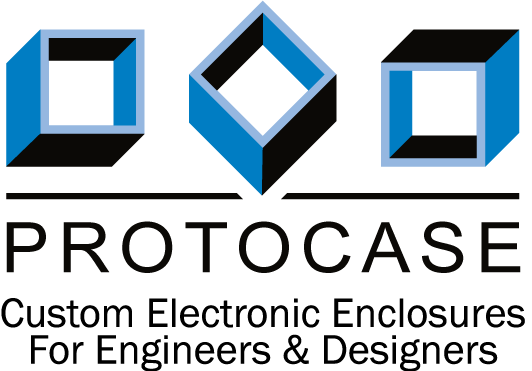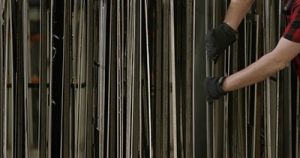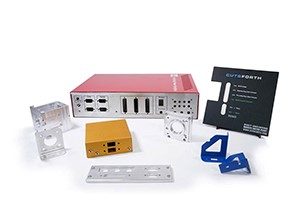
How to Choose the Right Metal for Your Custom Enclosure or Part

Protocase Inc.
One of the first steps in designing a custom enclosure or part is choosing what metal you will use. Ultimately, your decision-making process should include a number of different factors:
- Price
- Environmental conditions in which your enclosure will be stored
- Aesthetics
- Weight considerations
Each of the sheet metals offered at Protocase to form the basis of your custom enclosure, part or panel offer their own unique advantages and ideal use cases: 
- Cold Rolled Steel
- Price: More cost-effective than stainless steel. Cold Rolled is an economical option.
- Environmental considerations: Not ideal in wet environments. It is the least corrosion resistant metal option we carry (this can be subverted with powdercoat, however).
- Aesthetics: Like all metals, it is basically indistinguishable looking to any other option with powdercoat. Cold rolled steel will rust if left uncoated.
- Weight: Heavy and stiff compared to aluminum. It is not as strong as Stainless, but has the same stiffness.
- Finishing options: Bare metal (though not recommended) or powdercoat.
Cold rolled steel is ideal for general purpose indoor enclosures. However, it will rust if not coated, so bare metal and grained finishes are not recommended. It can be extremely durable indoors when finished with powdercoat. However, it is not inherently corrosion resistant. Cold rolled steel will degrade quickly in harsh or wet environments, and is therefore not ideal for outdoor use. It is a very stiff metal compared to aluminum. For its structural integrity, it is an excellent cost-effective option.
- Stainless Steel
- Price: The most expensive of the options we carry for general purpose enclosures.
- Environmental Conditions: The most inherently corrosion resistant of our metal options.
- Aesthetics: Especially striking with grained finish, many people prefer the look of stainless steel.
- Weight: Stainless is the close to the same weight as cold rolled steel, with the same stiffness but a higher strength. It is heavier than aluminum.
- Finishing Options: Bare metal, grained finish, or powdercoat.
Stainless steel is the premium solution to corrosion resistance, because of its chromium and nickel content. However, that chromium and nickel comes at a cost and makes stainless more expensive than cold-rolled steel, aluminum or galvanneal. It is good for use with general purpose enclosures if corrosion or aesthetics are a concern.
Consider using Stainless steel if any of the following properties are important:
- Resistance to corrosion
- Prevention of product contamination
- Resistance to oxidation
- Ease of fabrication
- Excellent formability
- Beauty of appearance
- Ease of cleaning
- High strength with low weight
- Good strength and toughness at cryogenic temperatures

- Aluminum
- Price: The price is comparable to cold rolled steel. It is also a very economical general purpose metal.
- Environmental Conditions: Offers some corrosion resistance, but not to the extent of stainless steel.
- Aesthetics: Offers good finishing options.
- Weight: The most lightweight metal we offer, however, aluminum doesn’t offer the same strength as other metals.
- Finishing Options: Bare metal, grained finish, and powdercoat. It can also be chem-filmed and anodized.
Aluminum is one of the most lightweight metals for enclosures, however to get to the same stiffness as cold-rolled steel, it requires a thicker gauge. It does not have to be chem-filmed form electrical contact, but chem-film will increase the durability of aluminum.
Aluminum is corrosion resistant and lightweight. Its lower stiffness requires a thicker gauge to match that of steel. Finishing options include bare metal, grained finish or powdercoat. If electrical contact is required in your design, the aluminum must be chem-filmed (chromate coated). It can also be anodized to put on a durable oxide coating. Consider aluminum where minimum weight and/or corrosion resistance are your key priorities.
The two kinds of aluminum we carry are aluminum 5052 Aluminum – H32 and 6061 Aluminum – T6. For sheet-metal parts, 5052 is preferred, as the metal can bend to a tighter radius than 6061 without cracking. For CNC machined parts, panels and enclosures, 6061 Aluminum is ideal, because the material is softer and is easily milled.
- Galvanneal
- Price: Galvanneal is slightly more expensive than cold rolled steel or aluminum because of the coating.
- Environmental Conditions: It is corrosion resistant as long as the coating is intact.
- Aesthetics: Dull grey finish.
- Weight: Similar to cold rolled.
- Finishing Options: Bare or Powdercoat
Galvanneal is a low-carbon steel coated with zinc and annealed for the zinc to bond via diffusion into the substrate. This prevents it from flaking off when formed or bent. The finish acts like a primer and easily adheres to paint, and creates a rust-proof surface as well. Galvanneal is much more durable than cold-rolled steel in wet environments, but less so than aluminum or stainless steel. Galvanneal offers good paintability, corrosion resistance, and formability.
Copper
While we do offer copper within our sheet-metal offerings, it is very rarely used as the material option for an enclosure. Copper offers excellent electrical conductivity, however it is extremely soft, and thus not ideal to form an enclosure. Copper is very expensive, especially compared to other sheet-metal materials.
Customers typically use copper for bus bars or miscellaneous parts. Contact us to discuss your options.
Conclusion
When you are designing a custom enclosure for your specific project or prototype, it’s important to start on the right foot by choosing the metal that will best suit your needs.
To recap, there a few good questions to guide you in your choice:
- Where will my enclosure be stored?
- Will my case need to withstand harsh environmental elements?
- How much is weight an issue for my enclosure?
- How budget-conscious do I need to be?
Once you have answered these questions and considered your needs thoroughly, you will have some guidance on the ideal metal for your custom enclosure.
And if you’re still unsure, or just want to talk through your design, contact us by emailing info@protocase.com or calling 1-866-849-3911! We are happy to help.
For more details on the basics of enclosure design, check out our Electronic Enclosure Design 101 blog post.
